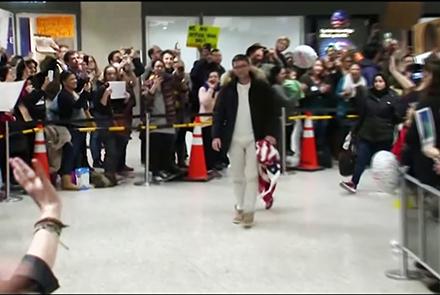President Donald Trump's administration on Sunday tempered a key element of his move to ban entry of refugees and people from seven Muslim-majority countries in the face of mounting criticism even from some prominent Republicans and protests that drew tens of thousands in major American cities.
Trump signed the directive on Friday, but the policy appeared to be evolving on the fly. Democrats and a growing number of Republicans assailed the move and foreign leaders condemned it amid court challenges and tumult at U.S airports.
Border and customs officials struggled to put Trump's directive into practice. Confusion persisted over details of implementation, in particular for the people who hold green cards.
White House Chief of Staff Reince Priebus went on the Sunday morning news programs to say those people would not be blocked. Asked why Saudi Arabia, Afghanistan, Pakistan and Egypt were not included on Trump's list, Priebus said that maybe more countries needed to be added to the executive order.
But Yasser Razayy, an Afghan citizen who flew into Dulles International Airport, said he and his wife and children had no problems going through security. Razayy served the U.S government mission for three years in Afghanistan and flew in on a Special Immigrant Visa.
"When I left home, I was not sure if I was going to make it because there were so many twisting news about people who were detained. The executive order was not very clear, so everyone is panicked right now in Afghanistan.
"It was very normal. It was really normal, nothing happened, so just like all the people, I was able to get through," he said.
"I'm really overwhelmed. When I heard the news about this executive order, I was kind of shocked and I really didn't know what to do. Last week I quit my job, so I was planning to come on 12th of February to the United States. But after Friday's executive order, I had to rebook and pack my bags, don't look back, and come to U.S.A. And it was like 18 hours of flight, and I was not sure if I was going to make it, if I would be detained, or if I would be able to enter. But luckily there was nothing wrong happened so me and my family were able to get through.
“So I'm really, really happy and I don't know what's going to happen next because it's so unpredictable. My recommendation to my fellow Afghans who are holding SIV (Special Immigrant Visas) visas right now is that they have to come and don't wait for anything to happen. I just want them to pack their bags and come because you don't know what's going to happen next. And I'm so happy," Razayy said.
Amber Murray, a human rights attorney, said: "It's such a relief because anybody who's coming in on an SIV, they faithfully serve the United States government for at least two years for them to come here and their life is in imminent danger and so of course we're worried that anybody who serves our government and our troops and gives mission critical information and assistance, we are worried about them facing a ban."
Murray went on to say: "Although Afghanistan was not affected directly, SIVs come through, sort of through a refugee processing, so it would've subjected them to that 120-day ban, which is what we didn't want. Because 120 days, they could be killed. There's been a number of translators whose families have been killed and they've been under imminent threat and I have a number of translators' families who are living in safe houses and just waiting for their visas to come here."
The Republican president on Friday put a four-month hold on allowing refugees into the country, an indefinite ban on refugees from Syria and a three-month bar on citizens from Iran, Iraq, Libya, Somalia, Sudan, Syria and Yemen.

